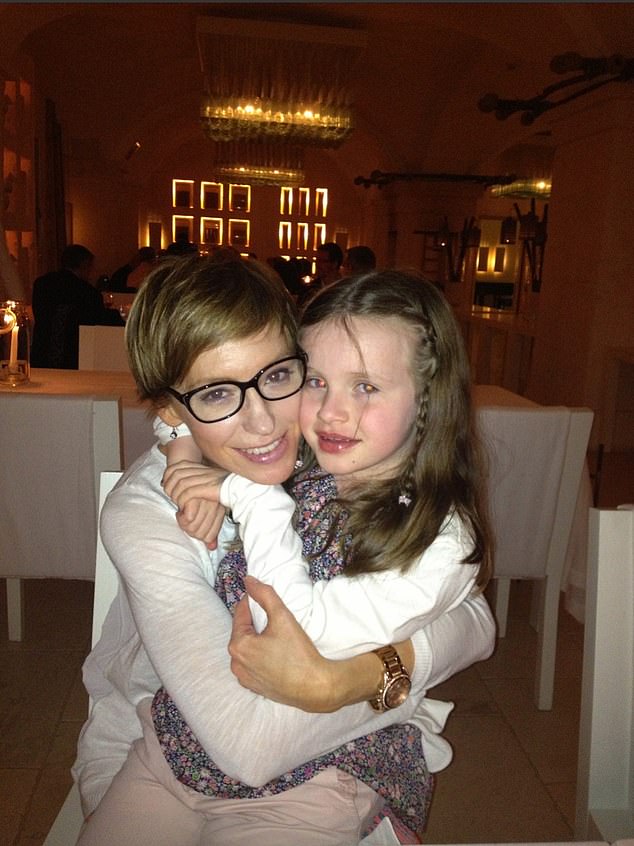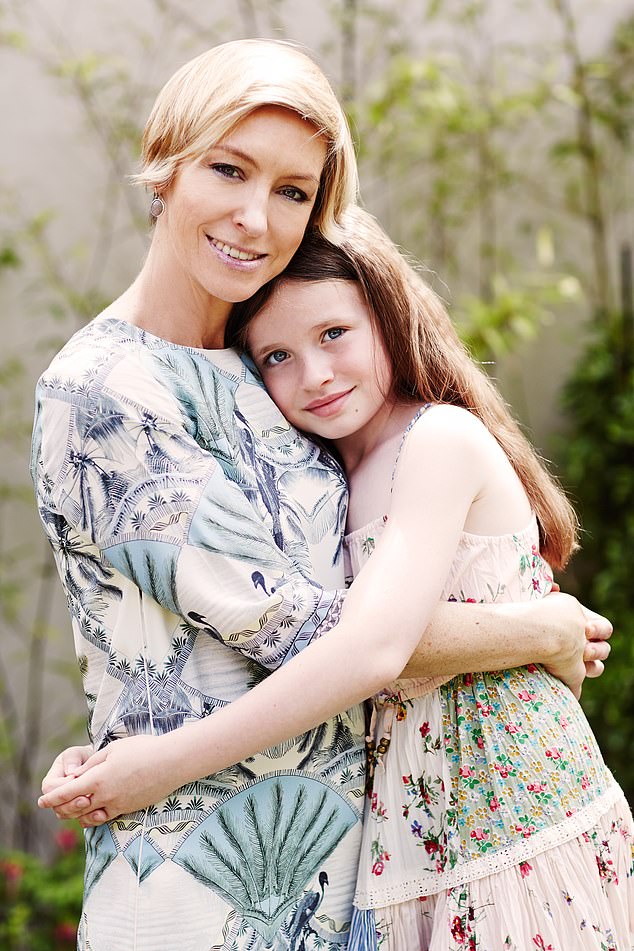I didn’t know whether to laugh or cry the day my not quite three‑year-old daughter, Evie, served me a brutal wake-up call. It was the last thing I expected as we jumped in the car heading for the cinema (Kung Fu Panda, if memory serves).
I caught sight of myself in the wing mirror and muttered to her dad that I thought my hair looked awful. Cue stirrings from the cheap seats in the back.
‘Mummy,’ she said. ‘You’re always saying you look awful or your hair looks horrible!’ My husband Ross shot me a side-eye and a smirk: ‘She’s right, you know.’
A throwaway comment, but one that spoke volumes. This tiny tot, still so very new to talking, had obviously been listening in for some time.
I was genuinely unaware that this was a routine spiel of mine.
But there it was from the mouth of a babe: I had apparently made a habit of running down my own appearance. A lot.
It rattled me into a stark re-assessment, right then and there.
At that moment, I vowed to do better. Evie was no longer a blob of a baby, but an actual little person with ears, eyes and a brain. I vowed to try to break a cycle of negative body image messages that all mums risk passing on to their daughters, whether they mean to or not.

Elvin was ‘obsessed with instilling in my daughter all the “right” healthy messaging: that food is fuel, that every body is beautiful and that skinny is not an ideal’
I remember spending many an hour in changing rooms with my own mother – a tall and slender size 8 – as she tore her reflection to pieces. Sometimes it felt as though she wouldn’t be satisfied until she’d found something vicious to say about every angle of her appearance, before she left another shop empty-handed.
I joked with some friends recently that to grow up a 1980s teen meant watching your mum exist on nothing but cottage cheese and Ryvita crackers.
They all laughed because it resonated; all of our mums seemed to be on a perma-diet. Weight-loss tips and arguments over whose thighs were the biggest dominated the chat at school pick-ups.
My generation vowed to be different. Eating disorders have existed for a very long time, but as they really became a media obsession, women of my generation grew to fear our children would one day succumb.
When I became a mother, I was also editor of Glamour magazine, and from time to time accused of inspiring eating disorders. Despite consciously featuring a diversity of models, celebrities and everyday women within our pages, there was no persuading some critics who wanted to tar all magazines with the same brush.
This relentless conversation resulted in me being obsessed with instilling in my daughter all the ‘right’ healthy messaging: that food is fuel, that every body is beautiful and that skinny is not an ideal.
She was seven when – and I can’t remember the context – she piped up with: ‘But I thought skinny was supposed to be a good thing.’ She did not hear that from me.
It was around this time that she also came home from school one day and announced she would not be eating pasta any more because Jenny’s mum had said it was a carb and carbs make you fat.

‘For my daughter’s sake, I tried hard to ignore the gremlin in my head telling me mine was the ugliest flesh on parade and strode down the beach in my swimsuit,’ writes Elvin
I flatly told her Jenny’s mum was talking rubbish – but the panic was taking hold of me. The outside world and all its inevitable, terrifying influences were creeping in. I redoubled my efforts to impress upon her that size was irrelevant to happiness.
So I made a point of never discussing bodies – mine, hers or anyone else’s. I was mindful of praising her for things such as running fast at her school sports day or swimming her first big laps of the pool. I was always conscious of bigging up what her body could do rather than how it looked.
I politely asked friends to avoid the diet and body chat in her company, too. Having a daughter really opened my eyes to just how much those conversations were the white noise of every damn day: which celebrities everyone thinks looks great, or who they think should lose a few pounds, or how fat they themselves were convinced they were and which crazy diet – Atkins? Two-day fasts? – they were currently trying.
The hardest part for me was in setting an example, i.e. exuding the body confidence that I did not actually possess. This was particularly challenging at the beach or the public pool.
But for my daughter’s sake, I tried hard to ignore the gremlin in my head telling me mine was the ugliest flesh on parade and strode down the beach in my swimsuit. I will show her that every body is a beach body, I thought. Even if secretly I can’t wait to hide in my kaftan again.
Still, I hoped I compensated for such wobbles by demonstrably eating, and eating well. By never calling any food ‘naughty’ or saying in jest that I’d have to run it off at the gym later.
I have also tried to set an example of what my body can do: I enjoy fitness, and my daughter sees this, but I have impressed upon her that I exercise to feel strong and healthy. I’ve never linked exercise with weight loss. We don’t even have scales in our house.
Yes, my generation were oh-so-much more enlightened about body image than our parents. With perhaps the same brand of hubris that had us smugly believing we’d never hand our screaming toddler an iPad in a restaurant, we thought if we banished all discussion of dieting our bums and tums into submission, then this particular battle would be won. I was in for another rude awakening…
When my daughter was a teen, she was having some issues with anxiety. It’s safe to say she’s not the only one who found it all a bit tough to navigate her GCSEs during Covid, but it was actually the return to school after lockdowns that saw her struggling even more. Right as the A-level pressures ramped up.
I don’t want to go into great detail but suffice it to say it was a frightening time, for her and her parents. We decided to try to help her with some counselling, which did make a difference.
During one of my catch-ups with the therapist, she mentioned that she thought it would be helpful if I would consider sharing with Evie some of my own body insecurities and hang-ups.
Eh? This felt a bit left-field to me, quite apart from exam worries. I’d never had any indication of Evie having body issues.
Exactly, was the gist of the therapist’s reply. She told me that, actually, Evie was feeling quite low about her developing body. Of course, that’s pretty standard for every teen ‘enjoying’ puberty, but apparently she was deeply reluctant to confide in me, her own mother, about any of it.
According to the therapist, it was because my daughter believed I had no body hang-ups whatsoever that I wouldn’t, couldn’t, understand what she was going through.
Worse still, Evie had reasoned in her teenage head that I might even be angry at her for feeling this way because, as far as she could tell, I believed hating your body was wrong.
If you are a mother, I can imagine you might have felt the same way I did at that moment.
I nodded and thanked the therapist for telling me all this, and said I would of course open up that conversation. But in my head I was thinking many unprintable expletives alongside the sobering fact: ‘Mums can’t win.’
I thought I’d done everything right. I thought ignoring our bodies, not discussing them, certainly not judging them in any way, was the key to making sure my daughter did not obsess about hers.
I had been so scared to say anything like ‘I hate my legs!’ in case my daughter noticed she had inherited the same legs and should, therefore, hate hers.
But looking back, I can now see how a young girl could have interpreted this approach – especially if she’s hearing a ton of body conversations at school – as meaning I couldn’t possibly relate to how she was feeling about herself. I felt more than a bit despairing; I can’t be alone in feeling exasperated by the multiple traps inherent in trying to get this issue right.
But I can now see that it makes sense that sometimes our daughters – and no doubt our sons – need to hear that we, too, have these moments of low self-esteem.
It’s a sad, apparently unavoidable fact that when the world is obsessed with bodies – and specifically with policing women’s bodies – there’s only so much one struggling parent can do to protect their child and be the voice of sanity.
Whatever we try to do in this area, and seemingly whatever we try not to do, we’re somehow failing. What are the answers? Any psychologists want to chip in at this point?
To be honest, as someone who now realises I will never get it all right, I’ve tried to stop worrying so much about my own behaviour.
I won’t pretend that the therapist’s advice gave us an instant Disney-fied ending. For one thing, I knew my daughter, a wilful teen, would not cheer at the prospect of suddenly sitting down for a heart-to-heart with her mum about bodies. So cringe!
But the therapist’s comments did help me give myself permission to relax, to not police myself quite so rigidly on talking about body image.
Slowly, subtly, over the next few weeks, I would say the odd thing to her like: ‘I’d have killed for your figure when I was your age. I used to get teased for being scrawny and it made me feel awful at the time.’ I hope it had the effect of making her realise she wasn’t alone in having some insecurities. I am relieved to say she is now a beautiful adult who balances good eating with enjoying Friday night pizza.
I know she has least favourite parts of her body, as we all do, but I know she doesn’t let it rule her life, either.
Whether it’s parenting style, or just dumb luck, she’s as balanced as any human woman can hope to be on the matter.
The biggest change I have made to my own approach since those days is one that I know flies in the face of a prevailing feminist mantra of our age. We’ve long been cautioned that it’s ‘sexist’ to compliment the way a girl looks, that we must praise intelligence, humour, strength – anything but the reductive subject of physical appearance.
I used to believe this and not comment on Evie’s looks or her body at all. I still don’t comment very often, but after my chat with the therapist that day, I realised it’s just human nature to be concerned with how we look.
I think problems occur when appearance is the only thing we value in girls. So I pepper in nice things when I think she looks pretty in an outfit, for instance, along with other things I might say about her personality or achievements.
I realised that if I didn’t occasionally say something nice about how she looks, she might assume my silence on the matter is because I think she’s ugly and I’m too polite to say.
Yeah, it’s a minefield alright.












